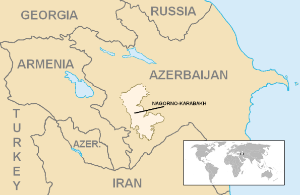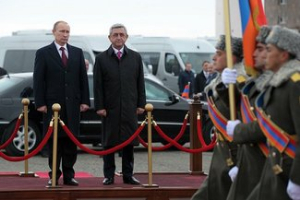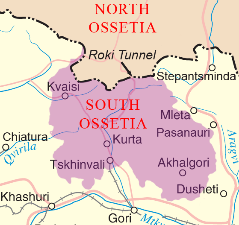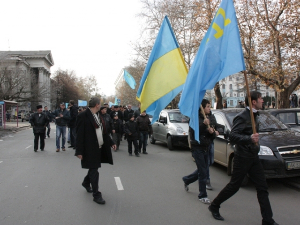Resurgence of the Nagorno-Karabakh Conflict - A Russian Move on the Ukraine Chessboard
By Avinoam Idan (09/03/2014 issue of the CACI Analyst)
The return of open fire in the Nagorno-Karabakh (NK) conflict recently brought about a meeting between the presidents of Azerbaijan and Armenia in Sochi, under the auspices of President Putin, on August 10, 2014. The growing tension in the conflict and the Sochi meeting take place against the background of the crisis in Ukraine. The Karabakh conflict serves as Russian leverage in influencing and promoting Russia’s geostrategic aims in the Caucasus and beyond, and Russia’s new initiative in the conflict meant to improve Russia’s stance in its confrontation with the U.S. and EU and its hegemony over the gateway to Eurasia.

Armenians Hope Sochi Meeting Will Relax Frontline Tensions
By Erik Davtyan (08/14/2014 issue of the CACI Analyst)
On August 10, a trilateral meeting took place between the presidents of Russia, Armenia and Azerbaijan. After the Kazan meeting in 2011, this was the first such meeting hosted by a Russian president. On August 8, Presidents Sargsyan and Aliyev had both paid a working visit to Sochi in order to discuss a wide range of issues, concerning Armenian-Russian and Azerbaijani-Russian relations respectively. Since both parties had expressed their willingness to hold a trilateral meeting, their official visits to Sochi presented a good opportunity for the dialogue between Armenia and Azerbaijan. The last meeting of the two presidents took place on November 19, 2013, in Vienna and was conducted with the participation of the Co-Chairs of the OSCE Minsk Group and the Personal Representative of the OSCE Chairman-in-Office Andrzej Kasprzyk.
The meeting focused on the situation in Nagorno-Karabakh, as well as the recent clashes on the Armenian-Azerbaijani border and the line of contact. While the working visit also pursued some other important issues (e.g. Armenian-Russian relations), the concerns among Armenia’s population over the events on the borderline and the possibility of a state-level discussion of that situation became the main point of interest during the trilateral meeting. Many Armenians attached great importance to the Sochi meeting due to the tense situation on the line of contact, which has since early August caused the deaths of over 20 soldiers. The recent skirmishes were the bloodiest fighting in two decades, and the proceedings at Sochi were therefore followed closely in Armenia.
In the first week of August, the developing situation on the frontline raised concerns among the Armenian public, fearing a possible escalation of the conflict. While clashes on the line of contact have occurred from time to time in past years, the massive breach of the cease-fire for a relatively long period of time, and the everyday news on the tense situation triggered perceptions that a return to large-scale military operations could be imminent. The death of 18 20-year-old soldiers in a week raised deep concerns among almost all Armenians, in Armenia as well as in the diaspora.
On August 7, President Aliyev’s military rhetoric on Twitter raised additional concerns in Armenia. Aliyev stated that Azerbaijanis “have beaten the Armenians on the political and economic fronts,” hence they “are able to defeat them on the battlefield.” These statements, which were actually made on the level of president, where received with a deep anger among Armenia’s population.
Both the borderline situation and Aliyev’s statements received reactions from Armenia’s Ministry of Foreign Affairs and were widely covered in Armenian mass media. Moreover, the international reactions to the events served to further underline the seriousness of the situation. The U.S. Department of State and the Russian Ministry of Foreign Affairs both expressed their stances towards the situation on the line of contact, which was one of the rare cases when the co-chairing states expressed their opinion not on the level of co-chairs, but foreign offices.
Russia’s mediation attempt was largely in line with the expectations of the Armenian public. Hence, most Armenians welcomed the chance for a meeting between the Armenian and Azerbaijani presidents. Despite the fact that Armenian society has an ambiguous attitude towards Russia and its relationship with Armenia, there was a relative unanimity towards the necessity of the Sochi meeting. Russia is considered to be Armenia’s strategic partner, and to secure part of Armenia’s state borders. Besides, Russia is one of the three members of the OSCE Minsk Group, as well as Armenia’s most significant arms supplier.
As the working visits of the Armenian and Azerbaijani presidents started on August 8, some Armenian experts are inclined to link that circumstance with the 6th anniversary of the August war between Russia and Georgia, thereby implying that there is an indirect message to Georgia’s neighboring states, Armenia and Azerbaijan. Nevertheless, the Sochi meeting drew the attention of Armenia’s population primarily due to its consequences for the acute situation on the frontline, rather than the prospects for approaching solutions to the Nagorno-Karabakh conflict itself. Therefore, this meeting, followed by a 10-month pause, largely satisfied the expectations of the Armenian public.
Russia Seeks Increased Control of Karabakh Resolution After Clashes Between Armenia and Azerbaijan
By Armen Grigoryan (08/14/2014 issue of the CACI Analyst)
After the recent clashes between Armenian and Azerbaijani forces, Russia’s leadership attempts to act more decisively in order to compromise the OSCE Minsk Group mediation efforts and to compel Armenia and Azerbaijan to accept Russia’s special role in the region. Russia’s proximity and strong influence over political elites and societies gives it an advantage over other Minsk Group co-chairs – the U.S. and France. However, the lack of security guarantees and economic perspectives may induce Armenia to start reviewing its attitudes concerning relations with different international actors and regional integration frameworks.

Russia Takes Steps to Absorb South Ossetia
By Valeriy Dzutsev (08/14/2014 issue of the CACI Analyst)
Against the backdrop of the events in Ukraine, Moscow appears to take steps toward quietly incorporating the Georgian breakaway region of South Ossetia into Russia. The republican authorities announced that plans were under way for South Ossetia and Russia to establish a unified customs checkpoint at the border between the two countries. Russia is on a collision course with Georgia over the South Caucasian country’s recent signing of an Association Agreement with the EU. As South Ossetia is again becoming an important tool for Moscow’s policies in the South Caucasus, the Russian government appears intent on establishing even greater control over its satellite state in the region and using it against Georgia.

Moscow and the Crimean Tatars: is Russia Inciting a New Jihadi Front?
By Stephen Blank (08/05/2014 issue of the CACI Analyst)
When Moscow invaded and annexed Crimea, it also reacquired control over the Crimean Tatar population there, approximately 300,000 people. Russia’s annexation is utterly at odds with the desires of the Crimean Tatars and their Majlis or Council. As the veteran Tatar leader Mustafa Dzhemilev has said, they want only autonomy within Ukraine, an insight based on the clear recognition that only in a democratic Ukraine, especially in the light of planned reforms to decentralize Ukraine’s administration, can their demands be met. The record of the treatment of Tatars in Crimea after Russia’s annexation implies that Moscow risks inciting a new insurgency, possibly with Jihadist overtones.







